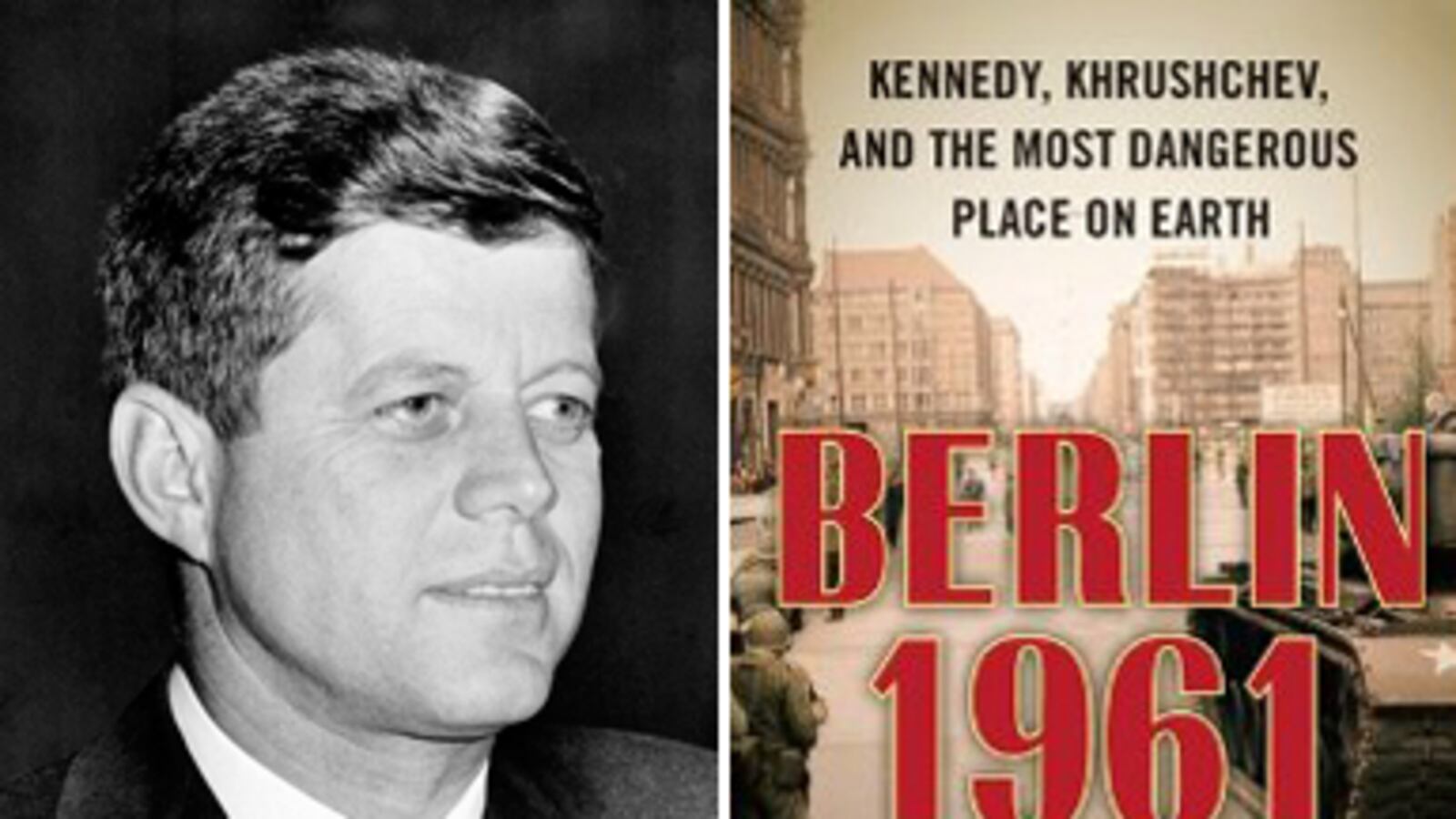Frederick Kempe’s new book, Berlin 1961: Kennedy, Khrushchev and the Most Dangerous Place on Earth, is deeply reported and researched, lucidly written, carefully considered—must reading for anyone interested in the subject. But while I am personally quite fond of its author, a former Wall Street Journal colleague, it is also fundamentally wrong in the conclusions it draws about some of the mistakes made by President John Kennedy during his first year in office.
Kempe’s essential argument is that had Kennedy been tougher at his Vienna summit with Soviet Premier Nikita Khrushchev, and/or more aggressive in response to Khrushchev’s subsequent bullying on Berlin, the wall erected in August 1961 would not have been built, East Germany might have soon collapsed, and the fall of the Soviet empire might have been accelerated by as much as three decades.
But Kempe’s own strong reporting indicates how little support there is for the first of this set of posited dominoes. As the book points out in stark terms, the East German state was on the verge of disintegration as a result of its open borders with the West—and in the face of the West German economic miracle—with as many as 2,000 of its people fleeing each day.
As Kennedy clearly saw, and as Kempe repeatedly notes but cannot fully recognize, Khrushchev could not permit the collapse of Walter Ulbricht’s German Democratic Republic. First, and most basically in the life of a politician, Khrushchev could not do so and remain in power. Had he tried, he would almost certainly have been removed—as he was in the aftermath of his later humiliations, notably the Cuban Missile Crisis.
And Khrushchev could not have permitted an East German collapse for precisely the reason that Kempe finds such a scenario so appealing: because Khrushchev and his colleagues at the time knew that if East Germany fell into the arms of the West, Hungary and Poland and Czechoslovakia and the rest would likely follow.
The central point of difference between 1961 and 1989, and the reason why Kempe’s argument is unconvincing, is because Khrushchev and his generation were simply not made of the same stuff as Mikhail Gorbachev and his generation. Khrushchev (and Leonid Brezhnev, Alexei Kosygin, and others around him) had lived as adults through the Second World War and had thrived, more or less, under Stalin. The death of scores of millions of their countrymen for a cause was something within their contemplation—indeed, within their experience. Moreover, these men, perhaps naively and in different ways to be sure, were committed heirs of the Bolsheviks, devoted children of the Revolution. (Khrushchev was 23 in 1917, Kosygin 13, Brezhnev 11.) In their lives, the Terror notwithstanding, Soviet communism had defeated Nazism and seemed to improve the lives of average Russian citizens. In their minds, communism was making progress. When Khrushchev said that the Soviets would soon “bury” capitalism, he knew he was exaggerating and blustering, but he almost surely believed that events were tending in that direction.
Kennedy did not force a group of aging but still-committed communists to choose between war and the end of their life’s work.

To conclude that such men, like Gorbachev and his colleagues later, would have surrendered their hard-won empire without a fight is simply unsupported by the historical record. That is the lesson of their use of force in crushing uprisings in East Germany in 1953 and in Hungary in 1956 and in Czechoslovakia in 1968. In the East Germany of 1961, no such option could be implemented so long as the borders with West Berlin remained open.
To be sure, Kennedy did blunder badly at the Bay of Pigs just three months into his term, did thus leave Khrushchev seeing him as weak, did worsen this problem at Vienna two months later when he failed to stand up to Khrushchev’s bullying, and did so again in his muted response to the Berlin crisis. The result, as we have long known—as Kennedy himself must have known almost as soon as his saw the aerial photographs the next year—was the Cuban Missile Crisis. So, yes, Kennedy’s early missteps contributed directly to two of the most dangerous moments in world history, the Berlin Crisis of 1961 and the Cuban Missile Crisis of 1962. He had warned in his own inaugural that “we dare not tempt them with weakness” and had then failed to follow his own injunction.

But in terms of what he did after the Bay of Pigs, rather than what he said, Kennedy deserves far less criticism. He did not take Khrushchev’s bait and start a shooting war or blunder into one. (As Kempe repeatedly points out, the only effective U.S. military option in such a war would have been to resort to nuclear weapons.) Kennedy did not follow the path Kempe seems to prefer and sacrifice the Atlantic Alliance on the way to pushing the Soviets to the brink. (Kempe acknowledges that tougher action on Berlin in 1961 would not have had British Tory support, not to mention Labour, or even that of the West Germans under Adenauer. And while de Gaulle was urging a harder line, it is hard to imagine French steadfastness if such a course had backfired.) Kennedy did not force a group of aging but still-committed communists to choose between war and the end of their life’s work. And he threatened war to save West Berlin but refused to do so to save the city’s Soviet zone—which is without doubt what the American people who elected him to office wanted him to do, on both scores.
All of this matters today, for reasons Kempe knows well and states clearly in his book’s final words, where he casts the Berlin Wall as “the iconic image of what unfree systems can impose when free leaders fail to resist.” Before we see the wall that way, and guide ourselves accordingly in some future crisis, we need to appreciate the catastrophic cost such resistance would likely have entailed.
Richard J. Tofel is general manager of ProPublica, the Pulitzer Prize–winning nonprofit devoted to investigative reporting in the public interest, and author of Sounding the Trumpet: The Making of John F. Kennedy’s Inaugural Address.






